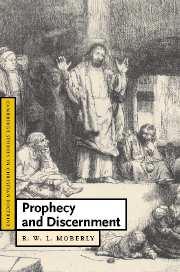Book contents
- Frontmatter
- Contents
- Preface
- List of abbreviations
- 1 What is prophecy, and can it be validated?
- 2 Jeremiah: the formulation of criteria for discernment
- 3 Micaiah ben Imlah: the costs of authenticity and discernment
- 4 Elisha and Balaam: the enabling and disabling of discernment
- 5 John: God's incarnate love as the key to discernment
- 6 Paul: cruciformity and the discernment of apostolic authenticity
- 7 Prophecy and discernment today?
- List of references
- Index of authors cited
- Index of scriptural references
- Index of subjects
1 - What is prophecy, and can it be validated?
Published online by Cambridge University Press: 05 May 2010
- Frontmatter
- Contents
- Preface
- List of abbreviations
- 1 What is prophecy, and can it be validated?
- 2 Jeremiah: the formulation of criteria for discernment
- 3 Micaiah ben Imlah: the costs of authenticity and discernment
- 4 Elisha and Balaam: the enabling and disabling of discernment
- 5 John: God's incarnate love as the key to discernment
- 6 Paul: cruciformity and the discernment of apostolic authenticity
- 7 Prophecy and discernment today?
- List of references
- Index of authors cited
- Index of scriptural references
- Index of subjects
Summary
If truth be told, the contemporary academy does not find the appeal to divine revelation at all attractive. Outside theology, and often within theology itself, the appeal to revelation is simply not permissible.
– william j. abraham (2002:254)In this study I wish to examine how the Bible presents the phenomenon of human speech on behalf of God – for which the prime biblical designation is ‘prophecy’ – and its disciplined critical appraisal – ‘discernment’. My purpose is to understand the Bible in its own right with a view to being able to appropriate it and bring it to bear upon issues of contemporary understanding and practice: how, in a contemporary context where, as in antiquity, numerous different conceptions of life and reality jostle in the market place, may it be possible to speak meaningfully of Christian faith in God and divine revelation as a matter of public, albeit contested, truth?
In this first chapter, there are three main aims. First, I wish to set out a preliminary biblical portrayal of the phenomenon of prophecy, in such a way as to clarify its basic conceptuality. Secondly, I will consider some of the obvious prima facie difficulties that are raised by attempts to regard the biblical conceptuality as genuinely meaningful and potentially valid, and look at the handling of these issues in some modern scholarship. Thirdly, I will briefly suggest a possible way ahead.
- Type
- Chapter
- Information
- Prophecy and Discernment , pp. 1 - 40Publisher: Cambridge University PressPrint publication year: 2006

